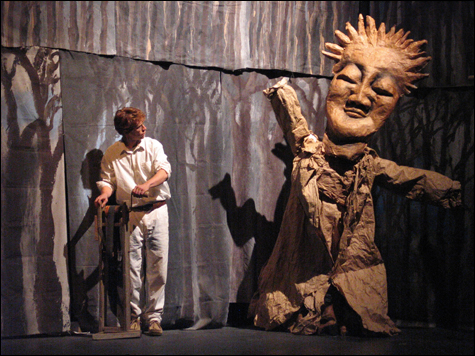
The Divine Reality Comedy |
“Abandon all hope, you who enter here” are the words we find inscribed across the gate of Hell at the beginning of the third canto of Inferno. And they’re a fitting slogan for Bread and Puppet Theater’s reimagining of Dante’s Commedia for the “War on Terror” era, The Divine Reality Comedy, which the Vermont troupe is bringing to the Boston Center for the Arts next weekend, along with, on February 9 and 10, the kid-friendly The Divine Reality Comedy Circus.
Dante’s epic begins in Hell and ends in Heaven. Bread and Puppet’s version, on the other hand, begins in “paradise,” home to the troupe’s acid satire of the dehumanizing effects of capitalism in the US today — complete with Santa Claus as the demon god of consumerism. The action lightens briefly with a ballet for cardboard horses. Then the show descends into a purgatory and hell of indefinite detentions, interrogations, and torture. Narrators read US government accounts while puppets and masked actors re-enact the dark deeds.
“I see the cruelty of this society as coming directly from the wonderful philosophy of capitalism,” Peter Schumann, who founded the company in 1962, explains. “I’m saying the School of the Americas and Abu Ghraib and Guantánamo are not ‘rotten apples,’ as Bush called them, but are philosophically correct, pinpointable climaxes of the system, the cruelty of the capitalist system.”
Bread and Puppet’s shows combine papier-mâché masks, tiny and giant cardboard puppets, experimental dance and performance, traditional pageantry, political protest, Brechtian didacticism, and poetic rituals. With a cast of dozens, plus puppets, plus a brass band, Schumann aims for an effect akin to that of the stone saints and demons of a European cathedral coming to life. The “bread” of the company’s name refers to home-baked loaves smeared with garlic aioli that it serves after each show.
Last year, Schumann sparked a small stir at the Boston Center for the Arts and later a larger one in Burlington, Vermont, when he exhibited paintings protesting what he sees as Israeli oppression of Palestinians matched with passages from John Hersey’s 1950 novel The Wall, which is about the Nazi extermination of Warsaw Ghetto Jews during World War II. He says his theme was an “oppressed people who oppress a people.” Critics charged him with equating today’s Israelis with the Nazis — which he says “wasn’t my intent.”
To prove he won’t be cowed, Schumann has returned to the Israeli-Palestinian theme with The University of Majd: The Story of a Palestinian Youth, an exhibit of seven large new paintings of his that will hang in the BCA Cyclorama February 4-10. But he acknowledges that last year he “may have unnecessarily hurt some people’s feelings,” so this time around he’s narrowed his focus to one young Palestinian man who he believes was falsely imprisoned by the Israeli government. He calls it “my attempt to speak up to a particular fate in a family whom I met in Palestine.”